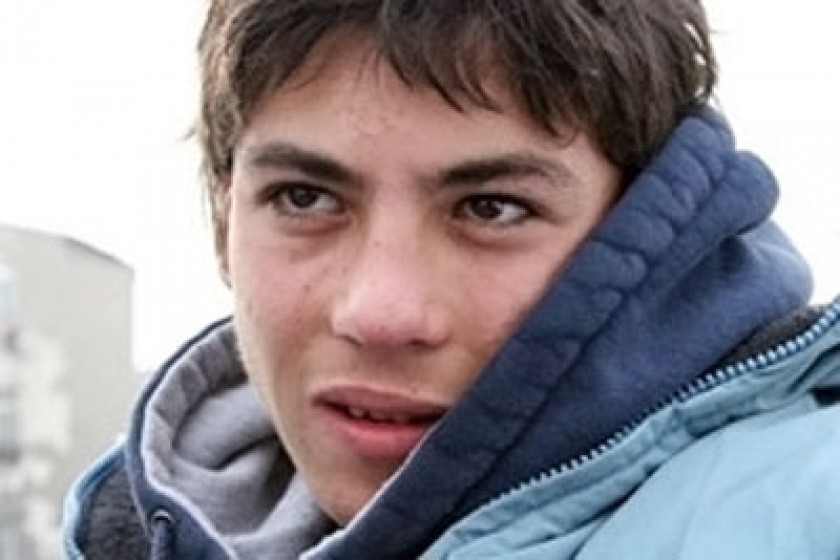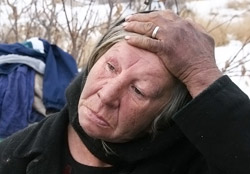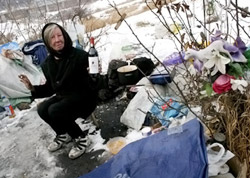
"Maybe you could get me a coat? I am cold in this one"
Little friend of the homeless
Fifteen-year-old Vadim Mesherekov knows nearly all the Russian homeless in the capital by name. He puts their number at more than fifty and became acquainted with them through his mother, Ira. “They were her friends,” he says. “Once they had homes, but now they don’t.”
Vadim’s mother died from a serous illness last March, but he continues to visit her friends, and sometimes takes them food. Although Vadim is not a homeless, he nonetheless also needs food and clothes. He lives with his uncle at #32 Smbat Zoravar Street. His uncle is over fifty, divorced, and hasn’t got any children of his own. His uncle's former wife, Vika, is one of the Russian homeless in Yerevan.
Vadim’s mother was Russian, but his father is Armenian. He never knew his father because he left for Germany before his son was born. He does, however, know that his father’s name is Armen. Vadim doesn't attend school and doesn’t know how to read and write. He says that he studied for a few years at Boarding school #2, but he has already forgotten what he learned there.
Vadim wants to attend school, but only if it is the type that he can return back home to in the evening. In the meantime, Vadim helps his uncle. “Sometimes I work,” he says, although he doesn‘t receive any allowance or assistance for his labor. Instead, he collects bottles from rubbish tips in order to buy bread and cigarettes.
When we tried to find out some more information about Vadim from the Shengavit municipality, it turned out that they didn’t know about the existence of the 15-year-old boy, but promised to help. The Ministry of Education also promised to help Vadim if they receive the required letter of application.
Gayane
 Gayane Yeghiazaryan heard the bells announcing the first day of 2006 in Yerevan's Republic Square, but when she became tired she went to sleep in the yard of Paronyan Theatre of Musical Comedy. “Before I was sleeping on the roof of a building and then in the basement of the “Rosia” cinema. Now it is in the yard of Pedagogical University,” she says before suddenly interrupting herself. “Maybe you could get me a coat? I am cold in this one.”
Gayane Yeghiazaryan heard the bells announcing the first day of 2006 in Yerevan's Republic Square, but when she became tired she went to sleep in the yard of Paronyan Theatre of Musical Comedy. “Before I was sleeping on the roof of a building and then in the basement of the “Rosia” cinema. Now it is in the yard of Pedagogical University,” she says before suddenly interrupting herself. “Maybe you could get me a coat? I am cold in this one.”
She is wearing a worn out coat, and the scarf wrapped over her head lost its color long ago. Like the majority of women in Yerevan who are homeless, she says that she is divorced, but used to have a home long ago. She says that “due to circumstances" she lost it.
Gayane also says that she has a 20-year-old daughter who is married and lives in Gyumri with her two children. However, she says that her daughter doesn’t know about the condition her mother is living in. It has been more than two years since Gayane last saw her daughter. She doesn’t visit because “she hardly survives herself.”
“I would like to find a little corner to live and work in,” Gayane dreams. “I don’t want anything else.” Other than that, she doesn’t go into any details as to how she lives, but assures us that she does not beg.
Vika and Seryoja
 |
 |
Seryoja found his wife, Vika, in the Komitas Pantheon. A Russian by nationality, she was living there with two homeless friends, Svetlana and Ira, but moved to live with Seryoja near the “Vstrech” bridge in a tent near a dried up lake four months ago.
“We love each other,“ says Vika, who turned fifty long ago. Vika is divorced, but Seryoja doesn’t want to speak about his family. He only says that his wife and children have known how he lives for two years now. “There are plenty of people like us in Yerevan -- more than one thousand,” he says.
According to him, many of these other homeless people died in the past year. They either froze to death or were stabbed during drunken fights. As for Seryoja, he says very little about himself apart from that he used to work as a driver at the Zeytun milk factory.” He also says that he lived in Poland for six years.
“I came back and became a bomzh,” he explains without looking at my face. “Sometimes I think I should apply to the Red Cross. Maybe they’ll give me work and somewhere to stay.”
He admits, however, that he doesn’t know why he hasn't.
Vika breaks the ensuing silence by producing an unopened bottle of wine. She says that tenants from the neighboring building brought the couple the bottle to celebrate the New Year. “They came and wished us a Happy New Year, brought everything, and keep on bringing things even now,” adds Seryoja.
Vika even decorated their “home” with pieces of wrapping paper, hanging them from the tree that also serves as the support for their tent. She hadn’t hung the symbol of 2006 -- the year of the dog -- on the tree, however. She had hung a goat.
Karine Asatryan
Photos by Onnik Krikorian
 Videos
Videos Photos
Photos
Write a comment